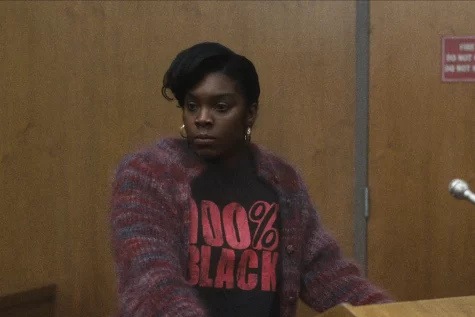Pain for Profit? Jeffrey Dahmer and the Underlying Implications of True-Crime
On September 21st 2022, Netflix released its highly anticipated series on one of America’s most infamous serial killers, titled, Dahmer – Monster: the Jeffrey Dahmer Story. The show was created by acclaimed television writer, director, and producer Ryan Murphy, credited with widely-known productions such as Glee and American Horror Story. However, dissimilar to AHS, Dahmer is described as a “biographical drama” along with being a “crime thriller,” pulling from historical events, figures, and narratives, while, of course, maintaining an element of entertainment.
Unlike the other criminology-related productions on the streaming platform, Dahmer is neither a work of pure fiction, nor a documentary-style piece. Following its release, the series has demonstrated high praise from a majority of its watchers, and average-to-high reviews from critics. However, the show has also experienced backlash from viewers online, akin to that leveraged against Netflix’s other productions, including a film of a similar nature, Extremely Wicked, Shockingly Evil and Vile. This film is classified under Netflix as both a Drama and Movie Based on Real Life- it entails an interpretation of Ted Bundy’s life, the murders he committed, his eventual capture, and the legal and personal aspects of such. Bundy is played by well-known actor and former teenage-heartthrob Zac Efron, and the controversies which bubbled following the film’s 2019 release primarily consisted of questions regarding Hollywood’s choices of both casting and production for the main objective of profit.
While there is no doubt that Bundy’s conventional attractiveness played a crucial role in his crimes, an element of his criminology which Extremely accurately captured, larger inquiries were posed by viewers regarding the necessity to make such films across the board- after all, if the greater purpose of these productions is to inform viewers on the atrocities committed by serial killers and their pathologies, a plethora of documentaries just on Ted Bundy exist within fingertip-reach of any curious internet user.
Of course, it must be considered that the world of film naturally draws on real life events, people, and tragedies, and the question of where a line should be drawn is a highly contentious and arguably arbitrary one. But to those who assert that the comparable Dahmer series was significantly beneficial in educating a mass audience on Jeffrey Dahmer, his pathology, and his victims – similarly to the case of Bundy – a sea of information entailing all of the above has already been presently accessible through productions centered around primary source evidence of Dahmer’s murders.
While creator Ryan Murphy is relishing in the success of yet another one of his productions (Dahmer sits as Netflix’s second most-streamed show of all time, following Stranger Things), he did not turn a blind eye to the criticism he faced. Demonstrative of Dahmer’s questionable status in the entertainment industry, Netflix was forced to confront public outcry following their initial placement of the series under its LGBTQ category on the streaming platform. Yet another example of the contentious nature regarding the ethics of its release, Murphy revealed that he objected to Netflix removing the [LGBTQ] tag from Dahmer after viewers complained: “I also don’t think that all gay stories have to be happy stories… I asked why they did that, and they said because people were upset because it was an upsetting story. I was, like, ‘Well, yeah.’ But it was a story of a gay man and more importantly, his gay victims.”
On the topic of the victims, many of the families of the predominantly Black and queer young men and boys Dahmer targeted have come forward with their stances on the series. While Murphy claimed in a statement to the public that he and his team had reached out to 20 victims’ families and friends during the three-and-a-half years spent on pre-production and research, numerous family members had previously contradicted this claim, including victim Errol Lindsey’s cousin, Eric Perry, who tweeted that his family found out about the show “when everyone else did.” Perry continued in his message to Twitter, “I’m not telling anyone what to watch, I know true crime media is huge right now, but if you’re actually curious about the victims, my family is pissed about this show… it’s retraumatizing over and over again, and for what? How many movies/shows/documentaries do we need?”
The questionable circumstances surrounding alleged communication with victims’ families is further heightened by a statement from Lindsey’s sister, Rita Isbell, who told Insider Magazine that she was “never contacted” about Murphy’s plans. This was especially eye-opening, as her victim impact statement at Dahmer’s sentencing in 1992 was re-created for the series- down to the unforgettable shirt she adorned whilst tearfully condemning Dahmer for the pain he caused the dozens of Milwaukee families affected by his insidious crimes. She elaborated on the glamorization she feels the show has amplified, as the city of Milwaukee has been growing in tourist attraction following Dahmer’s murders, resurged by the release of the show; Isbell attests that tourists still go to Milwaukee to take pictures and knock on neighbors’ doors. She also expressed her view that at least a portion of the profits from the show should have been given to families of the victims: “If the show benefited them in some way, it wouldn’t feel so harsh and careless… It’s sad that they’re just making money off of this tragedy. That’s just greed.”
Aligning with the concerns voiced by relatives of Dahmer’s victims, critics have noted a far-from-new phenomenon occurring once again within sensationalized true-crime: overt and brazen romanticization of figures when played by celebrities of general public likeability. Long-time heartthrob, Evan Peters, who plays Dahmer in the show, has become another central example of this occurrence. This has been observable primarily amongst white viewers, particular white straight women and queer men in online spaces, who have joked about how attractive Dahmer is, referring to both the real-life and Peters’-portrayed versions.
Regarding his statement on his purpose with the series, Murphy has added that he wanted to tell Dahmer’s story because “…it was the biggest thing I’ve ever seen that really sort of examines how easy it is to get away with things with the white privilege aspects.” Ironically, this statement is in direct contradiction to the many critical claims regarding a growing culture of a “true crime industrial complex,” or an expanding white-male dominated entertainment industry centered around adaptations of real-life stories coming to screens, regardless of the say of people involved. Additionally, earlier this month, a crew member from the series revealed that it was “one of the worst” shows she’s worked on as a person of color, claiming that she was often mistaken for another Black colleague on Murphy’s set.
In spite of the growing backlash against Dahmer, Netflix has announced its Monster series will return, set to become “an anthology series that follows other notorious figures who left their mark on society” for at least two more seasons.
No matter how you weigh impact versus intent, or consider the publicization of Dahmer’s crimes to be a profit-focused campaign, or merely another addition to the indubitably fascinating world of true crime, Eric Perry’s final statements on the matter speaks for itself: “No my family is not happy. Rest in peace to my cousin Errol Lindsey, and all the other victims.”

Sophia is an IB senior looking forward to her second year with the Banner, and fourth year overall involved with a school paper. Within Harriton, she is...



